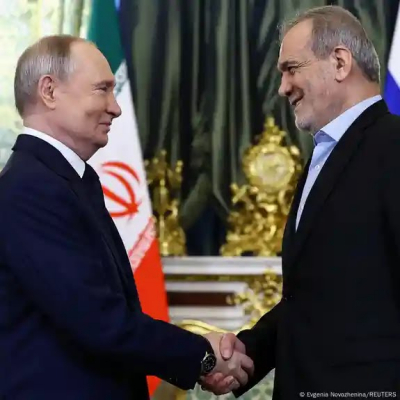Iranian President Masoud Pezeshkian arrived in Moscow on Friday for talks with Russian President Vladimir Putin and the signing of a strategic partnership treaty.
Under the new partnership agreement, Pezeshkian and Putin plan to intensify collaboration across various sectors — including military, nuclear energy, advanced technology and financial cooperation to combat international sanctions.
Both Iran and Russia have been heavily impacted by Western sanctions — Moscow over the war in Ukraine, Tehran over its contested nuclear weapons program — and Pezeshkian's visit underscores Iran's strategic pivot towards alliances in the East, particularly with Russia.
What does this partnership really mean for Iran's future?
Abbas Araghchi, Iran's Foreign Minister, emphasized the significant role of Iran and Russia as major powers in shaping a new global order.
He described the Iran-Russia agreement not merely as a political document but as a roadmap for the future.
A key aspect of the deal is strengthening security and defense cooperation.
Iranian President Masoud Pezeshkian's visit to Moscow signals a deepening strategic partnership with Russia, focusing on military, nuclear, and economic cooperation.
Iranian President Masoud Pezeshkian arrived in Moscow on Friday for talks with Russian President Vladimir Putin and the signing of a strategic partnership treaty.
Under the new partnership agreement, Pezeshkian and Putin plan to intensify collaboration across various sectors — including military, nuclear energy, advanced technology and financial cooperation to combat international sanctions.
Both Iran and Russia have been heavily impacted by Western sanctions — Moscow over the war in Ukraine, Tehran over its contested nuclear weapons program — and Pezeshkian's visit underscores Iran's strategic pivot towards alliances in the East, particularly with Russia.
What does this partnership really mean for Iran's future?
Abbas Araghchi, Iran's Foreign Minister, emphasized the significant role of Iran and Russia as major powers in shaping a new global order.
He described the Iran-Russia agreement not merely as a political document but as a roadmap for the future.
A key aspect of the deal is strengthening security and defense cooperation.
How powerful is Iran really?
Drawing on their experience in combating terrorism and extremism, Araghchi noted that this partnership aims to enhance regional and global stability.
He told Iranian state TV that while it covers defense and security cooperation, "this is a complete and comprehensive treaty, not one focused on a specific purpose, such as a military alliance."
Decades of Iran-Russia cooperation
This visit builds on the 20-year strategic agreement initially signed in 2001 under former reformist President Mohammad Khatami, which has been periodically renewed and serves as the foundation for collaboration in the energy, defense, and military sectors.
Although the details of the new treaty were not released, Iranian officials emphasize that it will bolster the framework of this historic partnership.
However, many experts suggest that, much like Iran's previous agreements with China — such as the 25-year cooperation deal signed in 2021 — the full scope of this new deal is unlikely to be revealed to the public, raising concerns over the hidden costs of such secretive alliances.
While Tehran may view its partnership with Moscow as a lifeline amid mounting international isolation, analysts suggest that Russia sees Iran as a secondary player in its broader strategy, which centers primarily on securing its relationship with the West, particularly with the United States.
Russia's collaboration with Iran is heavily shaped by its own objectives, notably its opposition to NATO , and the war in Ukraine.
Analysts suggest that Tehran's role in Moscow's broader foreign policy strategy is secondary to its negotiations with major powers, particularly the United States.
"Russia's primary focus is on securing its interests with Washington, especially regarding NATO's presence in Eastern Europe and Ukraine's potential membership," Ahmad Vakhshiteh, a senior lecturer at the Peoples' Friendship University of Russia (RUDN) in Moscow, told DW.
"Tehran may benefit from this partnership, but Russia will ultimately prioritize its own strategic goals," he added.
More about:
















































